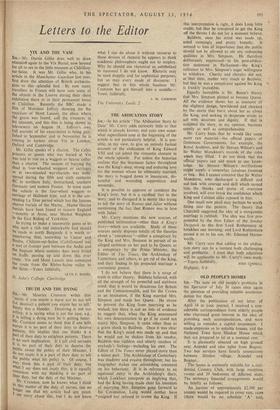TRUTH AND THE DYING
SIR,—Mr. Maurice Cranston writes that surely if you enjoin a mu-se not to not tell (1.e. deceive) a patient you enjoin her to tell.' Surely this a blunder. Deceiving is not not telling; it is saying what is not the case, e.g., It is telling a dying man he is getting better. Mr. Cranston seems to think that if one tells nurses it is no part of their duty to deceive Patients, this implies that one thinks it a part of their duty to enlighten patients. There is 110 such implication. If I tell civil servants it is no part of their duty to deceive the public about the policy of their Minister, I do not imply it is a part of their duty to tell the public what his policy is. Of course, I "a)' think this a part of their duty; but What I say does not imply this; i4 is equally consistent with my thinking it no part of their duty, but the duty of the Minister. Mr. Cranston, now he knows what I think in this matter of the duty of nurses, can no longer see that my article had any point.
., am sorry about this, but I do not know what I can do about it without recourse to those devices of rhetoric he appears to think academic philosophers ought not to employ. Why he should use rhetorical as antithetical to reasoned I do not know. Rhetoric may be used sloppily and for sophistical purposes, but so may every mode of discourse. I suggest that in this whole business Mr. Cranston has got himself into a muddle.— Yours faithfully, The University, Leech, 2
I. M. CAMERON


































 Previous page
Previous page